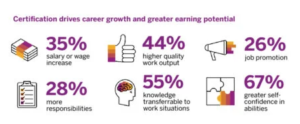![]()
SAP (Systems, Applications, and Products in Data Processing) is one of the world’s most widely used enterprise resource planning (ERP) systems. It helps businesses across different sectors manage various functions, including finance, supply chain, human resources, and more. In Nigeria, as businesses continue to grow and embrace technology, the demand for SAP-certified professionals is increasing.
If you’re interested in gaining skills in SAP, this article will guide you through everything you need to know about SAP certification in Nigeria—course details, eligibility requirements, fees, and the potential career benefits.
What is SAP Certification?
SAP certification is an official credential that validates your knowledge and expertise in using SAP software. By earning an SAP certification, you demonstrate your ability to implement, manage, and optimize SAP systems within businesses. This certification can boost your career and open up job opportunities in various industries such as banking, oil and gas, retail, and telecommunications.
SAP Certification Courses: Course Details and Syllabus
SAP offers numerous courses tailored to specific business functions. Some of the most popular SAP certification courses include:
- SAP Financial Accounting (FI): Focuses on managing financial transactions and reports.
- SAP Materials Management (MM): Helps manage procurement and inventory management processes.
- SAP Sales and Distribution (SD): Concentrates on managing sales, distribution, and customer service processes.
- SAP Human Capital Management (HCM): Focuses on HR and payroll management within SAP.
- SAP Production Planning (PP): Aims to streamline production and manufacturing processes.
Each course comes with a structured syllabus that generally includes:
- An introduction to SAP and ERP systems
- Core concepts and terminology used in SAP
- In-depth training in the specific SAP module
- Practical exercises to understand how SAP integrates with business processes
- Knowledge of SAP tools used for day-to-day tasks in business areas
Eligibility Criteria for SAP Certification in Nigeria
The eligibility requirements for SAP certification in Nigeria are similar to those in other regions, though they may vary based on the course and the training provider. Here are some general guidelines:
- Basic Knowledge: You should have a basic understanding of business operations or have a background in areas like finance, IT, or management. Some foundational knowledge in the field you wish to pursue is helpful.
- Educational Qualifications: While some courses may only require a high school diploma, most SAP certification programs are designed for individuals with at least a bachelor’s degree or equivalent qualifications.
- Prior Experience: While prior experience in SAP may not always be mandatory, having some familiarity with business software or SAP itself can be beneficial for advanced courses.
How Much does SAP training cost in Nigeria
The cost of SAP certification in Nigeria can vary, depending on the training provider, the module chosen, and the mode of learning. On average, you can expect the following:
- Training Fees: SAP courses typically cost between ₦250,000 and ₦1,500,000 in Nigeria, depending on the complexity of the course.
- Certification Exam Fees: The exam fees for SAP certification can range from ₦150,000 to ₦250,000, depending on the module.
While these fees may seem high, they are an investment in your future, as SAP-certified professionals often enjoy higher salaries and greater job security. It’s also worth noting that some companies may sponsor SAP training for their employees, so it’s a good idea to check with your current employer if they can assist with the costs.

What can I do with an SAP Certification
SAP-certified professionals are in high demand in Nigeria, as more companies are adopting SAP solutions to streamline their business processes. Here are some of the career opportunities that may open up after completing an SAP certification:
- SAP Consultant: SAP consultants help businesses implement and optimize SAP systems, ensuring they function efficiently and meet business needs. Specializing in modules like SAP FI, MM, or HCM can lead to lucrative consulting opportunities.
- SAP Analyst: SAP analysts focus on analyzing data and optimizing the performance of SAP systems, ensuring they align with business goals and provide actionable insights.
- SAP Project Manager: Project managers oversee SAP implementation projects, ensuring that the system is successfully integrated into the company’s workflow while keeping the project on schedule and within budget.
- Business Process Consultant: These professionals help businesses design and optimize their processes using SAP software to enhance efficiency and reduce operational costs.
Many Nigerian industries, including banking, telecommunications, oil and gas, and retail, are constantly looking for SAP-skilled professionals. As SAP is widely used by multinational companies in Nigeria, being SAP certified can also open up international job opportunities.
Scope of SAP Certification in Nigeria
SAP certification in Nigeria offers a broad range of benefits. Here’s why it’s worth considering:
- Growing Demand: With the ongoing digital transformation in Nigeria, companies are increasingly adopting SAP solutions, creating a growing demand for skilled professionals.
- High Earning Potential: SAP-certified professionals are among the highest-paid employees in the IT and business sectors in Nigeria. Roles such as SAP consultants, project managers, and analysts command competitive salaries.
- Career Advancement: An SAP certification can significantly boost your career. Whether you’re just starting out or looking to move into a more senior role, SAP certification can help accelerate your career growth.

Is SAP Worth Learning in Nigeria?
The decision to pursue SAP certification ultimately depends on your career goals. However, given the increasing reliance on SAP in Nigerian industries and the potential for career growth, the certification is highly recommended for individuals aiming to work in the technology or business management sectors.
While the certification process requires a financial investment and time commitment, the long-term career benefits—such as higher salaries, job security, and career progression—make it a worthwhile pursuit.
Where to Learn SAP Courses online or physical
There are several institutions offering SAP courses in Nigeria, institution like Seed Builders has proven to be the best in teaching SAP courses both online and offline.
Seed Builders is located in Lagos, Abuja and Nasarawa, if you find yourself close to any of these states, reach out to them for a physical class or you can also sign up for their online class.
Conclusion
SAP certification is a valuable asset for anyone looking to advance their career in Nigeria, particularly in fields like business management, finance, and technology. With SAP playing a pivotal role in many large organizations, being certified can significantly enhance your employability and open up various career opportunities.
If you’re ready to take the next step in your career, consider pursuing SAP certification and position yourself for success in Nigeria’s rapidly growing business and technology sectors.




